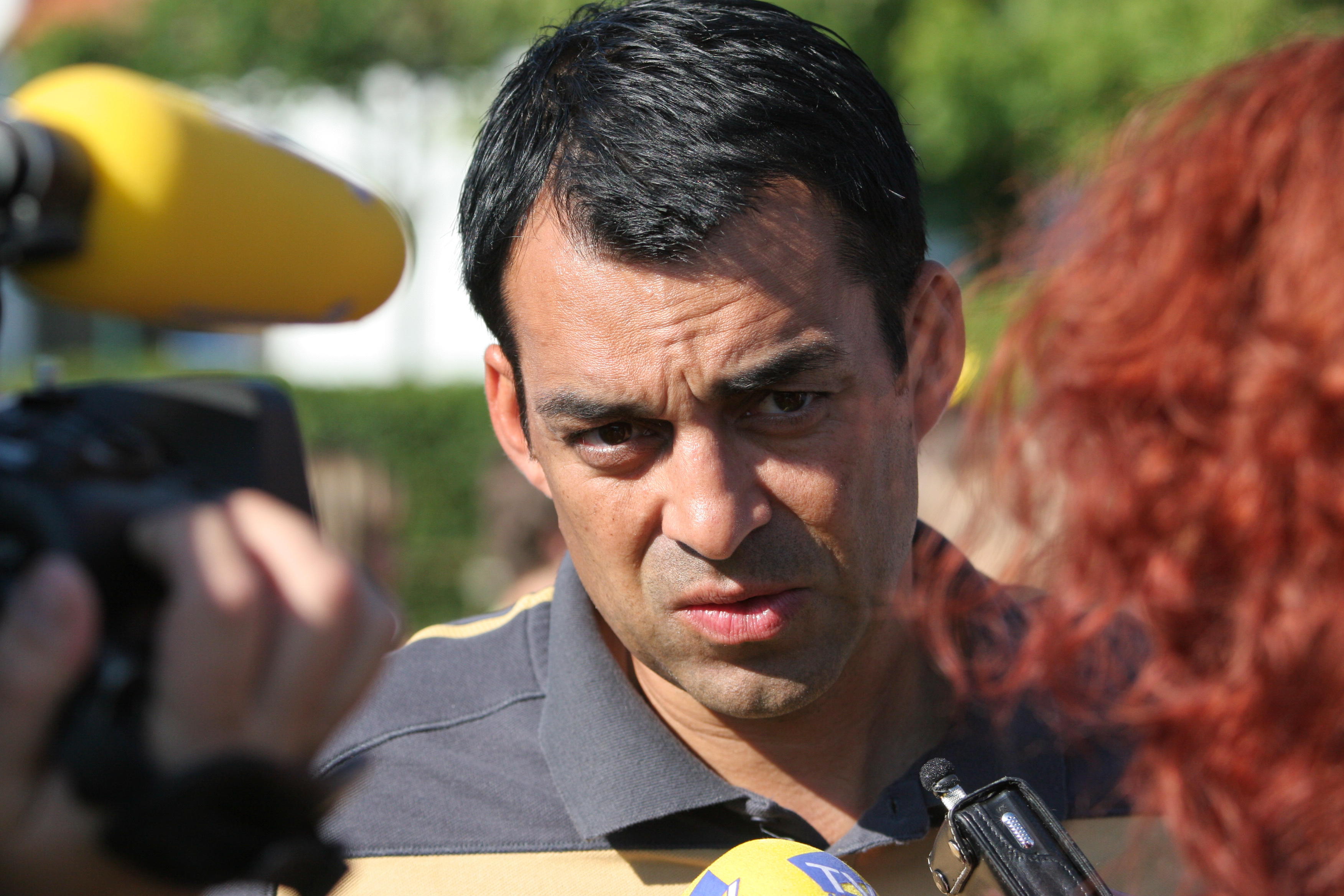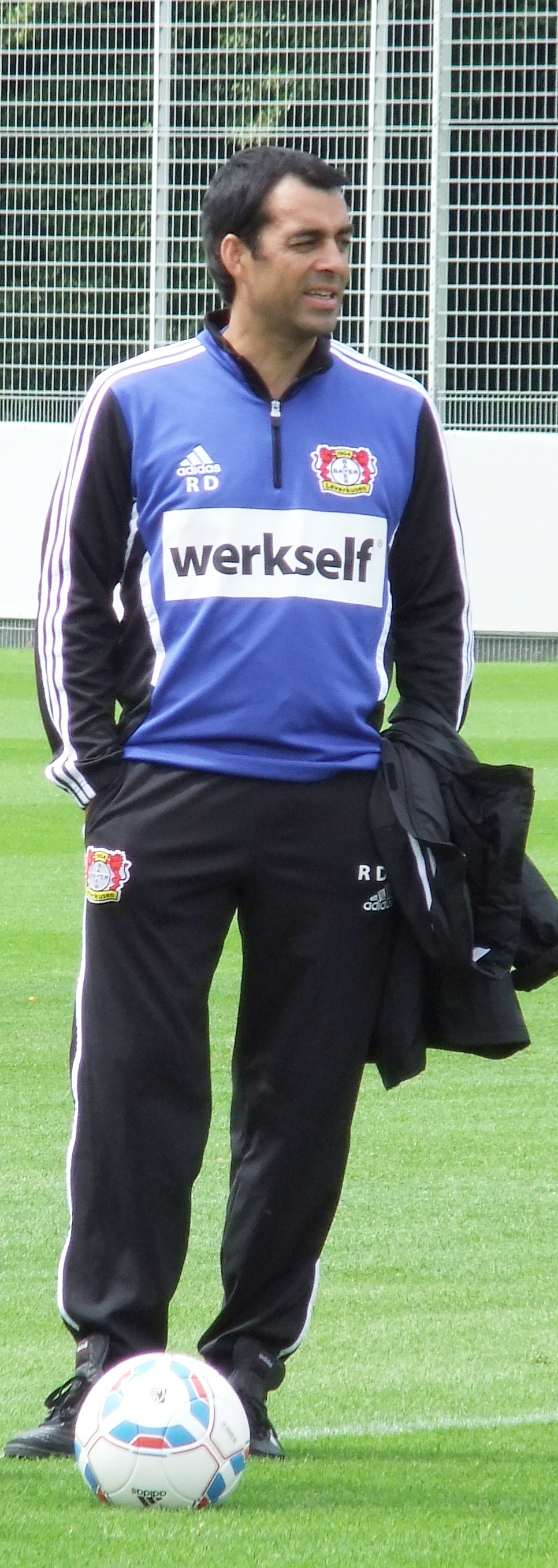1. Early Life and Family Background
Robin Dutt was born on January 24, 1965, in Köln-Lindenthal, a district of Cologne in North Rhine-Westphalia, Germany. He is the son of an Indian Bengali father, Sabyasachi Dutt, who originated from Kolkata and moved to Germany in the late 1950s. His mother is German, from the Hochschwarzwald region. Dutt was raised near Stuttgart, where he also cultivated a keen business acumen in the industrial sector.
2. Playing Career
Dutt's football career as a player primarily took place in the amateur leagues of Germany. He played in the fifth, sixth, and seventh divisions, showcasing his dedication to the sport from an early age.
He started his youth career at SVGG Hirschlanden-Schöckingen until 1983, continuing to play for their senior team in the Kreisliga until 1985. From 1985 to 1987, he played for TSV Korntal in the Bezirksliga. He then moved to TSV Münchingen, playing there from 1987 to 1988 before returning to TSV Korntal from 1988 to 1990, both times in the Bezirksliga. His career progressed to FV Zuffenhausen in the Verbandsliga from 1990 to 1993, and he concluded his playing days at SKV Rutesheim in the Bezirksliga from 1993 to 1995.
3. Coaching and Executive Career
Robin Dutt's coaching and executive career spans several German and Austrian clubs, as well as a significant role within the German Football Association, characterized by a steady ascent and a focus on strategic development.
3.1. Early Coaching Roles
Dutt began his coaching journey towards the end of his playing career. From 1995 to 1999, he served as a player-coach for TSG Leonberg. In his final year as manager, he successfully guided the club to promotion to the next division, marking his first coaching success. Following this, Dutt joined TSF Ditzingen in the 1999-2000 season. He initially coached their second team while also serving as an assistant coach for the first team. In 2000, he was promoted to head coach of TSF Ditzingen's first team, which competed in the Oberliga.
3.2. Stuttgarter Kickers
Dutt's growing success began to earn him local recognition. In the summer of 2002, he joined Stuttgarter Kickers, a former Bundesliga side, as the coach of their second team, which also played in the Oberliga. His leadership quality quickly became evident, leading to his promotion to head coach of the first team on October 28, 2003. At the time, the club was competing in the Regionalliga (then the fourth division) and was facing significant financial difficulties. Dutt successfully guided a young team through these challenging times.
A notable achievement during his tenure was winning the WFV-Pokal in both the 2004-05 and 2005-06 seasons, which secured their participation in the DFB-Pokal. The highlight came in the 2006-07 DFB-Pokal when Stuttgarter Kickers achieved a significant upset by beating Bundesliga side Hamburger SV 4-3 after extra time in the first round on September 9, 2006. On June 10, 2005, Dutt distinguished himself academically, graduating from the Hennes-Weisweiler-Academy (a coaching school at the German Sport University Cologne) at the top of his class with an excellent overall grade of 1.4. By September 2006, Dutt began receiving multiple offers from professional clubs, including consideration for the head coach position at Hannover 96 as a successor to Peter Neururer, but he ultimately chose to take on the challenge at SC Freiburg.
3.3. SC Freiburg
Robin Dutt embarked on a significant chapter of his coaching career when he joined SC Freiburg, a 2. Bundesliga club, as head coach in the summer of 2007. He succeeded Volker Finke, who had been the club's coach for an unprecedented 16 years, setting a record in German professional football. Dutt's initial season saw the team finish fifth in the 2. Bundesliga. His impressive work quickly gained recognition, leading to an extension of his contract until 2010 in May 2008.

In his second year, Dutt's efforts culminated in a major achievement: on May 10, 2009, SC Freiburg won the 2. Bundesliga title, securing their return to the Bundesliga after a four-year absence. Following this success, his contract was further extended until the summer of 2012 on October 23, 2009. In their first season back in the Bundesliga, Dutt successfully steered Freiburg away from relegation, finishing four points above the relegation playoff spot. The 2010-11 Bundesliga season proved to be Dutt's last at SC Freiburg, with the team performing strongly to finish in ninth position after being in sixth place at the mid-season break.
Reflecting on his four years at SC Freiburg, the renowned German sports newspaper Kicker summarized Dutt's impact, stating, "Robin Dutt, like Finke, left his mark on the club in his own way. He was a person with a concrete, analytical tone, employing clever and sophisticated rhetoric, whose daily work was meticulous and innovative. He displayed modern and varied ideas in his play and approached team development with an ambitious and strategic attitude." This assessment highlights Dutt's distinctive and effective coaching philosophy.
3.4. Bayer Leverkusen
On March 21, 2011, Bayer 04 Leverkusen announced Dutt as their new head coach, succeeding Jupp Heynckes who had moved to Bayern Munich. Dutt officially took the reins on July 1, 2011, signing a two-year contract with an option for a further year, extending until June 30, 2013. He arrived with clear ambitions, stating, "I didn't come to Leverkusen to turn a second-placed team into a fourth- or fifth-placed team. We came second (last season) and I want to improve on that." He also brought his own coaching staff, including coach Damir Burić and goalkeeper coach Marco Langner, to the club.

During his tenure, despite battling a series of key player absences, Dutt's team achieved significant victories, notably against Chelsea F.C. and Valencia CF in the UEFA Champions League, and secured a historic win against Bayern Munich in the Bundesliga, their first since 2004. Dutt's rapid ascent in his managerial career was particularly noteworthy; having started as an amateur player and coach in lower to mid-tier leagues, he reached the position of head coach for a UEFA Champions League participant after only four club changes. However, Dutt was ultimately dismissed from his post on April 1, 2012, after a challenging period. This included a significant 7-1 away defeat at Barcelona in the 2011-12 UEFA Champions League round of 16, where Lionel Messi became the first player to score five goals in a Champions League match. He was also held responsible for a streak of four consecutive Bundesliga defeats, which saw Leverkusen drop to sixth position in the league table.
3.5. German Football Association (DFB)
In August 2012, Robin Dutt transitioned from club management to a pivotal executive role within the German Football Association (DFB). From August 1, 2012, to May 31, 2013, he served as the Sporting Director, succeeding Matthias Sammer, who had moved to Bayern Munich as an executive board member. In this capacity, Dutt was entrusted with crucial responsibilities related to optimizing youth development programs, promoting talented players through the national system, and enhancing coach education initiatives. His work aimed to streamline the DFB's efforts in nurturing future football talent and maintaining Germany's competitive edge. In May 2013, the DFB approved his request to take on a new coaching opportunity with Werder Bremen.
3.6. Werder Bremen
On May 27, 2013, Dutt was appointed as the new head coach of Werder Bremen. He signed a three-year contract set to run until June 30, 2016. However, his tenure at the club was challenging. Following a period of severe struggle and poor results, which marked one of the worst slumps in the club's recent history, Werder Bremen decided to dismiss Dutt on October 25, 2014, less than a year and a half into his contract.
3.7. VfB Stuttgart (Executive Role)
On January 6, 2015, Robin Dutt returned to an executive position, joining VfB Stuttgart as the board representative for sport. He signed a contract that was intended to last until December 2018. In this role, Dutt was responsible for the club's sporting direction and strategy. However, his tenure was cut short. In May 2016, Dutt was fired following the team's relegation from the Bundesliga. This marked a significant setback for VfB Stuttgart, as it was the first time the club had been relegated in 40 years.
3.8. VfL Bochum
Robin Dutt was appointed as the manager of VfL Bochum on February 11, 2018, with immediate effect. At the time of his appointment, the club was struggling in the 2. Bundesliga, sitting in 14th place with 26 points after 26 matches. Dutt, alongside coach Heiko Butscher, successfully implemented a turnaround strategy for the team. After an initial 0-1 loss to 1. FC Heidenheim, the team went on an impressive nine-match unbeaten streak. This strong performance ensured their survival in the 2. Bundesliga, confirmed by a 2-1 victory against FC Erzgebirge Aue on matchday 32. Under Dutt's leadership, VfL Bochum ultimately climbed to finish in a respectable sixth position by the end of the season.
Building on this success, the team maintained a strong start in the 2018-19 season, leading to an extension of Dutt's contract until June 30, 2020, in October 2018. However, despite these efforts, Dutt was ultimately dismissed on August 26, 2019, due to a decline in results and performance.
3.9. Wolfsberger AC
In April 2021, Austrian Bundesliga club Wolfsberger AC announced that Robin Dutt would become their new head coach, effective from August 2021 for the start of the 2021-22 season. He continues to manage the team.
4. Managerial Statistics
As of March 12, 2023:
| Team | Nat | From | To | Record | |||||||
|---|---|---|---|---|---|---|---|---|---|---|---|
| G | W | D | L | GF | GA | GD | Win % | ||||
| TSF Ditzingen | Germany | July 1, 2000 | June 30, 2002 | 68 | 19 | 17 | 32 | 86 | 123 | -37 | 27.94 |
| Stuttgarter Kickers II | Germany | July 1, 2002 | October 27, 2003 | 48 | 20 | 10 | 18 | 56 | 53 | +3 | 41.67 |
| Stuttgarter Kickers | Germany | October 27, 2003 | June 30, 2007 | 126 | 49 | 36 | 41 | 185 | 160 | +25 | 38.89 |
| SC Freiburg | Germany | July 1, 2007 | June 30, 2011 | 145 | 63 | 28 | 54 | 199 | 200 | -1 | 43.45 |
| Bayer Leverkusen | Germany | July 1, 2011 | April 1, 2012 | 37 | 14 | 8 | 15 | 52 | 60 | -8 | 37.84 |
| Werder Bremen | Germany | May 27, 2013 | October 25, 2014 | 45 | 11 | 13 | 21 | 56 | 94 | -38 | 24.44 |
| VfL Bochum | Germany | February 12, 2018 | August 26, 2019 | 52 | 18 | 17 | 17 | 76 | 76 | 0 | 34.62 |
| Wolfsberger AC | Austria | July 1, 2021 | Present | 66 | 29 | 9 | 28 | 120 | 111 | +9 | 43.94 |
| Total | 588 | 223 | 138 | 227 | 830 | 877 | -47 | 37.93 | |||
5. Personal Life
Robin Dutt is married and has one son. In addition to his football career, he is known to possess significant business acumen, particularly in the industrial sector.
6. External links
- [https://www.kicker.de/news/fussball/2bundesliga/vereine/trainersteckbrief/object/3135/saison/2007-08 Robin Dutt's profile at kicker.de]
- [https://www.transfermarkt.com/robin-dutt/profil/trainer/1049 Robin Dutt profile at Transfermarkt]
- [https://www.weltfussball.de/spieler_profil/robin-dutt/ Robin Dutt profile at Weltfussball.de]